Икра, часть первая
The word икра has several meanings in Russian. The first one that comes to mind is caviar, which means fish eggs. Russians love caviar. In the US it's a rare family that buys caviar, but in Russia it's very common to buy caviar for parties. It's considered a treat and a way of showing your guests that you are a host that will go all out for them. It is either put in a bowl from which the guests serve themselves with a small spoon, or it is set upon pieces of bread with butter.
| The most common type of caviar to buy is красная икра red caviar. Sometimes red caviar consists of light orange eggs, each of which is a bit bigger than the plastic head of a sewing pin. | 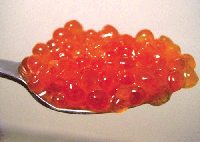 |
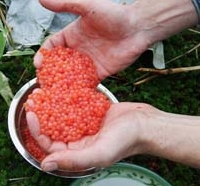 |
Sometimes it is larger salmon eggs that resemble the “Balls o' Fire” bait used in the US for fishing. |
| Sometimes it is чёрная икра black caviar, which is small gray-black sturgeon eggs and is the most expensive kind. | 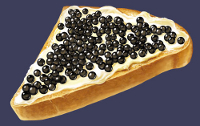 |
A quick look on the web shows that you can easily pay over a hundred dollars an ounce for caviar, and I've even seen it priced at nearly two hundred dollars an ounce:
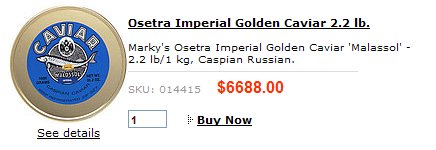
What could be odder than paying $200 for a tiny mass of fish eggs? Why, smearing it on your face for cosmetic effect, of course:
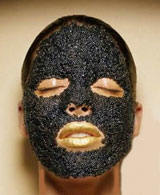
When my fellow blogger Таня saw this picture, she said, “I just want to lick that caviar off her face!” Thanks a million, Таня. That's an image I won't be able to get out of my mind for weeks.
Here are a few sample sentences:
| Блины с красной икрой – национальное русское блюдо. (source) | Blintzes with red caviar are a Russian ethnic dish. |
| Я люблю чёрную икру больше, чем красную. | I like black caviar more than red. |
| Миланские полицейские приняли решение раздать малоимущим горожанам 40 килограммов белужьей икры, изъятой в прошлом месяце у двух контрабандистов. (source) | Milanese police have decided to distribute to needy citizens forty kilos of beluga caviar that was confiscated last month from two smugglers. |
Wow, those Italians… feeding caviar to the poor. I'm moving to Milan.
Ничто, ничего
The word for nothing in Russian is ничто. Grammatically we call it a negative pronoun, and as a pronoun of course it occurs in all six cases:
| Nom | ничто |
| Acc | direct object: ничего after prepositions: ни во что, ни на что |
| Gen | ничего |
| Pre | ни о чём |
| Dat | ничему |
| Ins | ничем |
The first curious thing to note about the word is that you rarely encounter the nominative case form; instead you often find the genitive. For instance, if you wanted to say “nothing helped,” you might expect the translation to be «ничто не помогло». That is a perfectly grammatical sentence, but more often you would hear something like this:
| Я попробовала разные лекарства, но ничего не помогло. | I tried various medicines, but nothing helped. |
That's not to say you won't ever see ничто. Back around 1997 there was an advertising campaign in Russia for Sprite. It began with posters of sexy models that said «Имидж ничто…» “Image is nothing…” and followed a while later by another set of posters with sexy models that said «Жажда всё» “Thirst is everything.” I remember being confused when I saw the first set of signs because they had nothing about Sprite on them, but weeks later I understood it when the second set of signs appeared that included Sprite images. Apparently the campaign worked: even a decade later you can still find people playing with the phrase. For instance, at the beginning of this month there was an article on podrobnosti.ru entitled «Имидж ничто, ответственоость всё» “Image is nothing; responsibility is everything.” The phrase has even penetrated popular humor:
 |
| “Image is nothing; thirst is everything. I won't let myself dry out.” |
It's worth remembering that once you put a form of ничто in a sentence, you must also include the negative particle не before the verb. And if ничто is the object of a preposition, the ни separates from the rest of the word and moves in front of the preposition:
| Я ничего не понимаю. | I don't understand anything. |
| — О чём ты говорил? — Я ни о чём не говорил. |
“What were you talking about?” “I wasn't talking about anything.” |
| Книжный шкаф упал, когда на него влез ребёнок, так как он ничем не был прибит к стене. | The book shelf fell over when the child climbed up it because it wasn't attached to the wall with anything. |
| Раненый солдат ни на что не смотрел, просто сидел тихо, не тратя силы. | The wounded soldier didn't look at anything. He simply sat quietly without wasting his energy. |
In conversation ничего acquires a wide range of meanings:
| — Как дела? — Ничего. |
“How are you doing?” “Okay.” |
| — Спасибо за деньги. — Ничего. |
“Thanks for the money.” “No big deal.” |
| — Как новое платье? — Ничего себе! |
“What do you think of my new dress?” “Wow! It's so beautiful.” |
Thus in the end nothing means a lot of different things. Ironic.
Привет, чао
In English we have some little rhyming phrases that people occasionally throw in conversations for cutesy effect. For instance, when saying goodbye, you might hear:
“After while, crocodile.”
Russian is not bereft of its cutesy moments as well:
| Здорово, корова! | Hi, Cow! |
| Привет-буфет. | Hello-snackbar. |
| Чао-какао. | Ciao-cocoa. |
«Привет-буфет» is a relatively recent phrase. Older Russians may not know it. «Здорово, корова» has been around a long time.
Силиконовая грудь
| The phrase силиконовая грудь means silicon breast [implant]. You are not likely to need one of these in Russia, but I had to blog about it because I came across this headline and story the other day: |  |
| Силиконовая грудь лопается при ДТП.¹ | Silicon breast bursts during auto accident. |
| Как отметили в полиции, грудь Елены сработала во время аварии подобно подушке безопасности. | As the police department noted, Elena's breasts worked like an airbag during the accident. |
| В отличие от водителя другой машины, Елена Маринова не получила серьезных травм. | In contrast to the driver of the other car, Elena Marinova did not receive serious injuries. |
| Однако, во время аварии силиконовые имплантанты в ее груди не выдержали нагрузки и лопнули. (source | mirror) | During the accident, however, the silicon implants in her breasts could not withstand the load, and they burst. |
Another headline reveals that silicon breast implants may also protect you from terrorism:
| Силиконовая грудь спасла израильтянку от ракеты "Хезболла". (source | mirror) | A silicon breast implant has saved an Israeli woman from a Hezbollah rocket. |
| Имплантант, вне всякого сомнения, остановил осколок и не дал ему продвинуться вглубь тела девушки. | There is no doubt that the implant stopped the shrapnel and prevented it from proceeding more deeply into the woman's body. |
 |
Perhaps if our previous President George W. Bush had known this, he could have set up a breast implant division of the Department of Homeland Security. Really, ladies, get your implants now: it's just another way you can participate in making America safe. The one downside, I suppose, is that the implant will prevent you from going into outer space: |
| Эксперты не исключают, что искусственный бюст может просто взорваться в полёте из-за перепадов давления. | Experts do not discount the possibility that an articifical bust might explode in flight due to falling pressure. |
| Это обстоятельство уже стало предметом для шуток. | This situation has already become the subject of jokes. |
| Как заявил один из специалистов, полёты в космос могут стать проверкой на натуральность груди. (source | mirror) | As one of the specialists declared, space flights could become a way to prove that one's bust is natural. |
¹ ДТП = дорожно-транспортное происшествие traffic accident (lit. road-transportation incident)
Грудь
Грудь is a feminine noun that means bosom in the sense of chest or breast(s). It's mostly used in the singular, even when talking about women's breasts. Although sometimes you'll hear people stress the word a bit differently in the singular, the most common stress pattern for the noun is:
| Sg | Pl | |
| Nom | грудь | груди |
| Acc | грудь | груди |
| Gen | груди | грудей |
| Pre | груди | грудях |
| Dat | груди | грудям |
| Ins | грудью | грудями |
Sample sentences:
| Грудь у меня что-то болит. Страшно. А вдруг это инфаркт? | My chest kind of hurts. Scary. What if it's a heart attack? |
| Не заметить её было трудно: при росте в 152 см. Долли обладала грудью феноменальных размеров и носила облегающие костюмы. (source) | It was hard not to notice her: at a height of 5' 0" Dolly [Parton] had breasts of phenomenal dimensions and she wore skin-tight costumes. |
Грудь is also used as a symbol of the center of one's feelings and desires just as heart is used in English:
| Милый мой, ты у меня в груди. (Есенин) | My beloved, you are [ever] in my heart. |
| Любовь в груди мне стала мукой. | The love in my heart has become torment. |
<< 1 ... 114 115 116 ...117 ...118 119 120 ...121 ...122 123 124 ... 158 >>